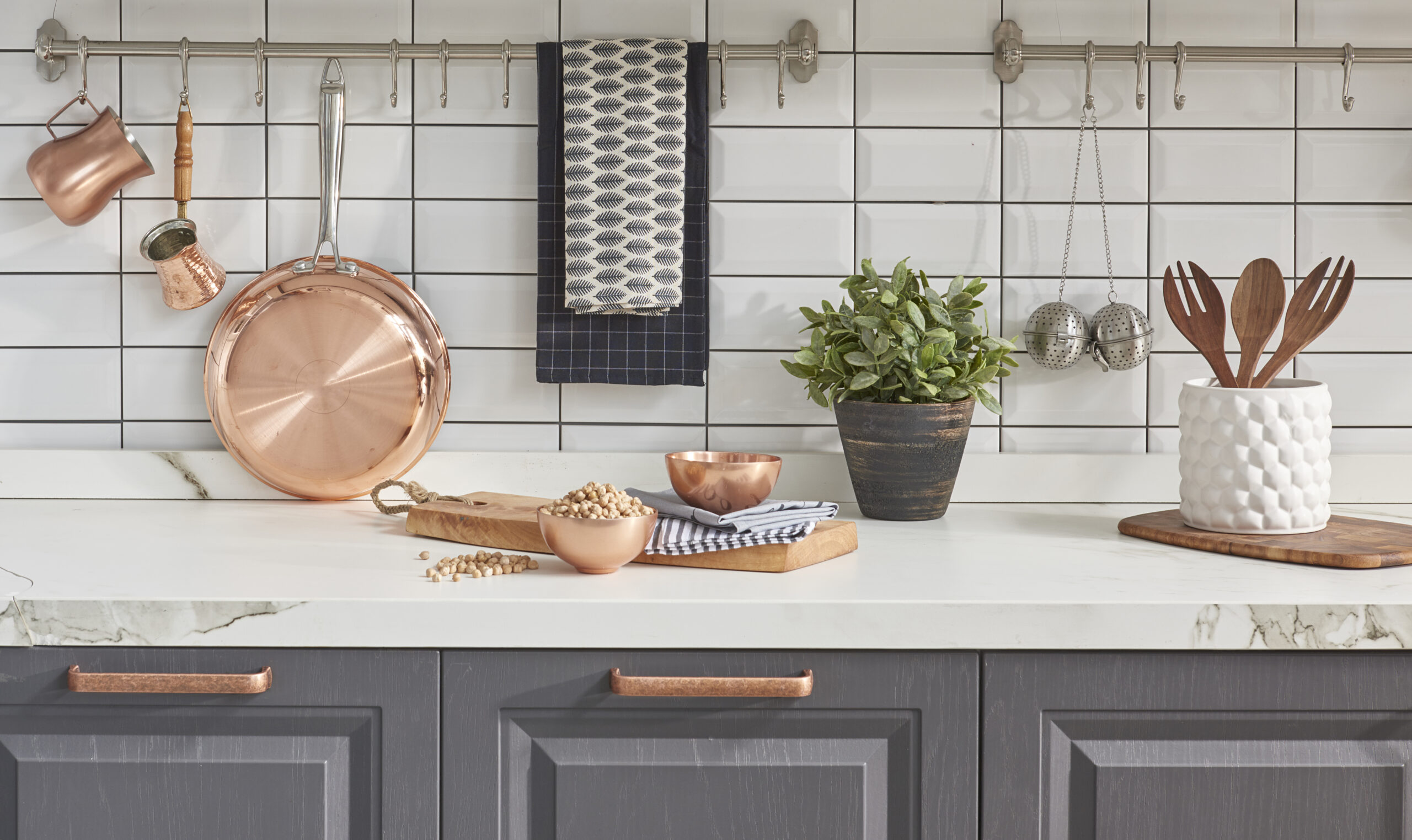The kitchen is one of the most important spaces in any home, and choosing the right countertop material is crucial for both functionality and style.
Natural stone countertops offer a timeless appeal that combines durability with beauty, making them a popular choice for many homeowners. With so many options available, knowing which natural stone will suit your kitchen best can be difficult.
In this article, we’ll explore the top natural stone options for kitchen countertops and what makes each one stand out.
Top Choices for Natural Stone Countertops
1. Granite
As a natural igneous rock formed under intense heat, granite can withstand high temperatures, scratches, and daily wear.
It’s an ideal option for busy households that need a durable, low-maintenance stone surface and want to add a touch of natural elegance to their kitchen design.
While granite is durable, it is a porous stone. This means it can absorb liquids if left unsealed. However, regular sealing (once a year for most countertops) will protect granite from stains and moisture.
Here are a few tips for maintaining your granite countertops:
- Clean with mild soap and water. Avoid using harsh chemicals, which can strip the sealant and damage the stone over time.
- Apply a high-quality sealant to keep granite resistant to stains from wine, oil, and acidic substances like lemon juice.
- Sprinkle a few drops of water on its surface. If the water absorbs into the stone within 10-15 minutes, it’s time to reseal.
Granite comes in a variety of finishes, including polished and honed. A polished finish gives the countertop a glossy, reflective surface, making it ideal for modern kitchens. A honed finish provides a more matte look, adding texture and subtlety to rustic or minimalist designs.
2. Quartzite
Often mistaken for quartz, quartzite is a natural metamorphic rock that originates from sandstone. Through natural processes of heat and pressure, quartzite transforms into a dense, durable stone, offering a marble-like aesthetic with superior strength.
Its beauty and toughness make it a top contender for homeowners seeking long-lasting, luxurious kitchen countertops.
Whether you’re designing a modern, traditional, or transitional kitchen, quartzite can fit seamlessly into your space.
- Modern Kitchens
The sleek, polished surface of quartzite can give a modern kitchen a high-end, luxurious feel. Its light, neutral colors pair well with minimalist cabinetry and stainless-steel appliances, creating a clean, streamlined look.
Polished finishes are especially popular in modern kitchens, as they add a reflective quality that enhances the stone’s natural beauty.
- Traditional Kitchens
Quartzite’s soft veining and neutral tones make it an excellent fit for more traditional kitchens. When paired with classic wooden cabinetry and decorative details like crown molding or intricate backsplashes, quartzite can add warmth and elegance to your space.
- Rustic and Farmhouse Kitchens
For a more rustic or farmhouse aesthetic, quartzite’s natural patterns and warm colors can give your space a welcoming, lived-in feel. Its durability makes it a practical choice for these styles, which often focus on functionality and natural materials.
3. Marble
As a metamorphic rock formed from limestone, marble features stunning veining and a smooth, polished finish that can elevate any kitchen design.
While marble is softer and more delicate than some other natural stones, such as granite or quartzite, it remains a highly desirable option for homeowners who prioritize elegance and are willing to invest in regular care.
If you love marble but want to reduce its exposure to potential damage, consider using it as an accent on a kitchen island or a baking station where it won’t endure heavy-duty use. Pairing it with a more durable countertop material for high-traffic areas can provide the best of both worlds.
Marble countertops are generally more expensive than other natural stones like granite or soapstone. Prices can range from $50 to $150 per square foot, depending on the type of marble and the complexity of installation.
Exotic varieties or rare color patterns will drive the cost up further. For more accurate pricing, you can request a quote from your supplier.
4. Limestone
Limestone is a sedimentary rock known for its soft, earthy tones and subtle texture. It’s a popular choice for homeowners who want to create a warm, natural, and timeless look in their kitchen due to its natural beauty and ability to age gracefully.
While limestone is not as hard as granite or quartzite, it can still be a durable and functional option when properly cared for.
Limestone typically comes in the following shades:
- Beige
- Cream
- Tan
- Light gray
These blend seamlessly with a variety of design styles. Its natural, earthy appearance brings warmth and comfort to the kitchen.
Limestone often has a more uniform appearance than stones like marble or granite. Its subtle veining and smooth texture add elegance without being overpowering, making it ideal for homeowners who want a classic, neutral countertop.
5. Soapstone
Soapstone is another natural stone that has been used for centuries. It is valued for its smooth texture and unique aging process. Unlike many other stones, soapstone develops a patina over time, giving it a rustic, lived-in appearance that adds character to any kitchen.
However, unlike other stones, the softness of soapstone can be considered a feature rather than a flaw.
Minor scratches and imperfections can often be easily repaired, and for many homeowners, these signs of wear contribute to the stone’s charm. These are some factors to consider about the durability of soapstone:
- Scratch Resistance
While soapstone may show scratches more easily than harder stones, most minor marks can be buffed with sandpaper. For deeper scratches, a light sanding followed by oiling can restore the surface’s smooth texture.
- Heat Resistance
One of soapstone’s strongest qualities is its heat resistance. You can place hot pots and pans directly on the surface without causing damage.
- Stain Resistance
Unlike more porous stones like marble, soapstone is naturally non-porous, which means it resists staining from liquids such as wine, oil, or acidic foods.
6. Slate
Slate is a fine-grained metamorphic rock with a dark, understated appearance and smooth texture. It’s highly durable and resistant to stains and heat, making it a practical and stylish choice for modern or contemporary kitchens.
With its sleek, matte finish and deep color palette, slate adds a touch of sophistication to any space while being easy to maintain.
Unlike more porous stones like marble or limestone, slate is naturally resistant to staining. Its non-porous nature also makes it less likely to harbor bacteria.
While slate is naturally non-porous, some homeowners choose to apply a sealant to enhance the color and protect the surface from wear. Sealing every few years is sufficient to maintain the stone’s appearance.
Slate is easy to clean with mild soap and water. Harsh chemicals are unnecessary and should be avoided to prevent damage to the surface.
7. Onyx
Onyx is a stunning, translucent stone known for its dramatic veining and vibrant colors. Due to its eye-catching appearance and unique ability to transmit light, it’s often used as a statement piece in kitchens.
This natural stone is more delicate than other natural stones and requires more care. However, its beauty and elegance make it a show-stopping choice for luxurious or high-end kitchens.
Onyx is soft and easily scratched, so it’s important to handle it with care. Avoid direct contact with knives or heavy cookware; always use cutting boards to protect the surface.
It’s also sensitive to heat, so hot pans should never be placed directly on the surface. Always use trivets or heat pads to prevent discoloration or damage.
Is Natural Stone Eco-Friendly?
Natural stone is a sustainable option because it is abundant and recyclable. The material is readily available in many regions around the world. It doesn’t rely on industrial manufacturing processes, reducing the carbon footprint associated with its extraction.
Moreover, natural stone sustainability can be enhanced by choosing locally sourced stones, reducing transportation emissions, and selecting stones that require minimal maintenance over time.
Stones like granite, quartzite, and marble can last for decades with minimal maintenance, meaning they don’t need to be replaced as often as other materials. This reduces waste and the environmental impact associated with manufacturing and transporting new materials.
When you decide to renovate, the stone can often be salvaged and reused in new designs or broken down for other construction purposes, reducing the amount of material that ends up in landfills.
Work with your natural stone supplier to maximize the yield of each slab and reduce waste. Leftover pieces can be repurposed into smaller projects like backsplashes or accents, ensuring that none of the material goes unused.
Find the Best Stone Surfaces for Your Home
Each type of stone offers unique characteristics, from marble’s classic elegance to quartzite’s resilience and limestone’s rustic charm.
Factors such as climate, maintenance, and design preferences can impact the selection of a stone that enhances your home and stands the test of time.
If you’re ready to explore premium natural stone options for your next project, contact Pietra Surfaces today. We offer a curated selection of high-quality stones sourced from the finest quarries around the world so your home reflects both style and substance.


